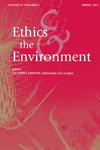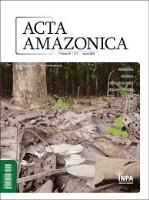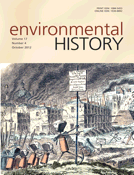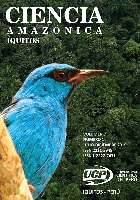
Trumpeter-Journal of Ecosophy
Scope & Guideline
Bridging Human Society and Nature through Critical Inquiry
Introduction
Aims and Scopes
- Ecophilosophy and Depth Ecology:
The journal emphasizes philosophical inquiries into ecological ethics, advocating for a depth ecology approach that prioritizes a profound connection with nature and the moral implications of human actions on the environment. - Environmental Ethics and Cultural Perspectives:
It explores environmental ethics through various cultural lenses, engaging with cross-cultural explorations that highlight diverse understandings of nature and our responsibilities towards it. - Creative Expressions of Ecological Awareness:
The journal encourages creative works, including poetry and narratives, that articulate ecological awareness and emotional responses to environmental challenges, promoting a deeper connection to the natural world. - Research on Ecological Practices and Masculinities:
There is a focus on examining ecological practices, including discussions on ecological masculinities and ecofeminism, which investigate gendered perspectives on environmental stewardship. - Contemporary Environmental Issues:
The journal addresses pressing environmental crises, including climate change and ecological degradation, linking philosophical discourse with real-world implications and practical guidance.
Trending and Emerging
- Engagement with Nature in Times of Crisis:
The journal is increasingly focusing on how individuals and communities engage with nature amid rapid environmental changes, emphasizing vulnerability, sentience, and autonomy, which are vital for fostering resilience. - Depth Ecology for the 21st Century:
There is a growing interest in reinterpreting and expanding depth ecology concepts for contemporary challenges, as seen in works that revisit foundational thinkers like Arne Naess and apply these ideas to modern ecological dilemmas. - Emotional and Aesthetic Responses to Nature:
Emerging themes highlight the importance of emotions and aesthetics in understanding our relationship with the natural world, suggesting that poetry and creative writing are valuable tools for ecological awareness. - Interdisciplinary Approaches to Ecological Issues:
The journal is embracing interdisciplinary perspectives, integrating insights from various fields such as psychology, sociology, and art to enrich the discourse around ecology and environmental ethics. - Focus on Local and Indigenous Knowledge:
An increasing emphasis on local and indigenous ecological knowledge is evident, promoting the value of diverse cultural perspectives in addressing environmental sustainability and ethical considerations.
Declining or Waning
- Traditional Environmentalism:
There appears to be a waning focus on traditional forms of environmentalism that do not incorporate philosophical or ethical dimensions, as the journal shifts towards more nuanced discussions that integrate philosophy with ecological practices. - Anthropocentric Perspectives:
Themes rooted in anthropocentrism are becoming less prominent, as the journal increasingly champions post-anthropocentric views that emphasize interconnectedness and the intrinsic value of non-human entities. - Purely Academic Research:
There is a noticeable decline in strictly academic research papers that lack a creative or philosophical angle, as the journal favors works that engage with emotional and experiential aspects of ecology.
Similar Journals

ENVIRONMENTAL VALUES
Cultivating Critical Conversations on Environmental EthicsENVIRONMENTAL VALUES is a distinguished journal dedicated to exploring the intricate intersections of environmental studies and philosophical discourse. Published by SAGE Publications Inc, this journal has made a significant mark within its fields, featuring a robust impact factor and making it an esteemed Q2 journal in Environmental Science and a prominent Q1 journal in Philosophy as of 2023. With an ISSN of 0963-2719 and an E-ISSN of 1752-7015, ENVIRONMENTAL VALUES provides a scholarly platform for rigorous research, theoretical exploration, and critical dialogue that spans across disciplines, thereby compellingly addressing the ethical dimensions of environmental issues. Its impressive Scopus rankings place it within the top percentile of both the Philosophy and General Environmental Science categories, underlining its relevance and influence. Researchers, professionals, and students are encouraged to engage with the journal to contribute to and learn from cutting-edge discussions that shape our understanding of environmental ethics and values as we move towards 2024 and beyond.

Ethics and the Environment
Illuminating the Ethical Pathways to Environmental Stewardship.Ethics and the Environment is a distinguished journal dedicated to the dialogue between ecological considerations and moral philosophy, published by Indiana University Press. With an emphasis on fostering interdisciplinary discourse, this journal addresses the ethical implications of environmental issues, making it an essential resource for researchers, professionals, and students in both the fields of Environmental Science and Philosophy. As of 2023, it holds a notable impact factor with its Q4 ranking in Environmental Science (miscellaneous) and a favorable Q2 ranking in Philosophy, reflecting its relevance and contribution to ongoing scholarly discussions. Although not an open-access publication, it provides valuable insights that hold practical significance for policy-making, conservation efforts, and sustainability practices. With coverage spanning from 2013 to 2024, the journal continues to engage with current global environmental challenges through a philosophical lens, positioning itself as a crucial platform for ethical explorations in environmental discourse.

WETLANDS ECOLOGY AND MANAGEMENT
Championing effective strategies for wetland preservation.Wetlands Ecology and Management, published by Springer, is an esteemed journal that has been advancing the field of wetland studies since its inception in 1982. Operating under the ISSN 0923-4861 and E-ISSN 1572-9834, this journal is headquartered in the Netherlands and serves as a critical resource for researchers, professionals, and students alike. It fosters interdisciplinary dialogue among aquatic science, ecology, and resource management disciplines, ranking in the Q2 category for Aquatic Science and Ecology, Evolution, Behavior and Systematics as of 2023. With a notable Scopus ranking, it is positioned favorably within the 65th percentile in Ecology and a commendable 58th percentile in Aquatic Sciences. The journal emphasizes the importance of effective management strategies and policies in the conservation of wetlands, making it indispensable for those aiming to drive impactful research. Although it is not an open-access journal, its high-quality publications remain accessible through library consortia and institutional subscriptions, ensuring that pertinent insights into the ecological dynamics and sustainable management practices are available to the global research community.

ACTA AMAZONICA
Exploring the Heart of Amazonian Science.ACTA AMAZONICA, an esteemed journal published by the Instituto Nacional de Pesquisas da Amazônia, is a pivotal resource in the fields of Agricultural and Biological Sciences, reflecting its stature with a 2023 Q2 category ranking. Since its inception in 1979 and transitioning to Open Access in 2003, this journal has dedicated itself to disseminating significant research related to the Amazon region, contributing to the understanding of its biodiversity, ecology, and sustainability challenges. With an ISSN of 0044-5967 and E-ISSN 1809-4392, ACTA AMAZONICA provides a platform for researchers, professionals, and students to share innovative findings and insights. Based in Manaus, Brazil, it plays a critical role in fostering collaborative research efforts that address environmental and conservation issues pertinent to the Amazonian context. Its commitment to accessibility ensures that valuable research is available to a wide audience, fulfilling its objective of promoting knowledge and encouraging dialogue amongst the global scientific community.

ENVIRONMENTAL HISTORY
Pioneering Scholarship that Connects Yesterday's Actions to Today's ChallengesENVIRONMENTAL HISTORY, published by the University of Chicago Press, serves as a leading interdisciplinary journal dedicated to the exploration of the intricate relationships between humans and the environment throughout history. With a prestigious Q1 ranking in History and a Q3 ranking in Environmental Science for 2023, the journal stands out for its commitment to advancing scholarship in both historical and environmental studies. Although it does not offer open access, its rich content is pivotal for researchers, professionals, and students who seek to understand the environmental implications of historical practices and policies. Covering the converged years from 1996 to 2024, ENVIRONMENTAL HISTORY aims to stimulate meaningful dialogue and promote innovative research methodologies that bridge past and present ecological issues. The journal's substantial contributions are evidenced by its notable Scopus rankings, placing it in the top percentile within its categories, reinforcing its importance in shaping contemporary environmental discourse.

NORTHWEST SCIENCE
Empowering researchers with vital insights from the Northwest.NORTHWEST SCIENCE, published by the NORTHWEST SCIENTIFIC ASSOCIATION, serves as a vital resource for researchers and professionals in the fields of ecology, evolution, and systematics. With an ISSN of 0029-344X and an E-ISSN of 2161-9859, this journal has been disseminating valuable scientific insights since its inception in 1975 and continues to do so into 2024. Although currently positioned in the Q4 quartile for its category, it plays a crucial role in advancing the understanding of ecological and biological sciences, reflecting a diverse range of studies and methodologies. Researchers will find the journal particularly appealing due to its emphasis on regional studies and their implications on a global scale. While NORTHWEST SCIENCE is not an open-access publication, it provides significant contributions to the academic dialogue within its discipline, making it an essential addition to the library of any dedicated researcher, student, or professional in the environmental sciences.

Contemporary Problems of Ecology
Empowering Voices in Environmental ResearchContemporary Problems of Ecology, published by MAIK NAUKA/INTERPERIODICA/SPRINGER, is a premier journal committed to advancing research in the field of Environmental Science. Since its inception in 2008, this journal has carved a niche for itself in addressing the pressing ecological challenges of our times, catering to an audience comprising researchers, professionals, and students dedicated to the sustainability and environmental health of our planet. The journal is indexed in Scopus, with a current ranking of #165 out of 233 in the Environmental Science category, reflecting its contributions to the academic community, despite its position in the 29th percentile. With the latest quartile ranking placing it in Q3 for miscellaneous Environmental Science from 2023, the journal continues to be a vital resource for disseminating innovative research findings. Contemporary Problems of Ecology promotes open access scholarship and aims to foster a dialogue among experts, making it an essential platform for those looking to engage with contemporary ecological issues and solutions. The journal actively seeks to publish original research articles, reviews, and case studies that push the boundaries of our understanding of environmental systems.

Physio-Geo
Advancing Earth Sciences for a Sustainable FuturePhysio-Geo (ISSN: 1958-573X) is a distinguished open-access journal published by REVUES ORG, dedicated to advancing the fields of Earth and Planetary Sciences, with a special focus on Earth-Surface Processes, Environmental Science, and Ecology. Since its inception in 2007, Physio-Geo has provided a platform for researchers, professionals, and students to disseminate and access high-quality studies that contribute to the understanding of our environment. With a convergence period from 2019 to 2024, the journal aims to bridge disciplinary gaps and foster interdisciplinary research that addresses pressing ecological and environmental challenges. Despite its current Scopus rankings reflecting an early-stage development, the journal is poised to enhance its impact within the scientific community, particularly as it embraces a wider audience through its open-access model. By offering valuable insights and comprehensive analyses, Physio-Geo is an essential resource for those seeking to explore the complex interactions between physical geography and ecological systems.

Theoretical and Applied Ecology
Innovating Research in Theory and PracticeTheoretical and Applied Ecology, an esteemed journal published by LLC PUBLISHING HOUSE, KAMERTON, is dedicated to advancing knowledge in the rigorous fields of ecology and applied ecological research. With the ISSN 1995-4301 and E-ISSN 2618-8406, this journal has established a firm foothold since its inception in 2017, converging impressive research and findings from the Russian Federation and beyond. Although currently lacking an impact factor and H-index, its Q3 ranking in Ecology and Ecology, Evolution, Behavior and Systematics exemplifies its growing influence in the academic community. Furthermore, its rankings in Scopus highlight its relevance within the environmental sciences and agricultural sectors. Committed to providing open access to scholarly articles and fostering a collaborative approach to ecological research, Theoretical and Applied Ecology serves as a vital resource for researchers, professionals, and students eager to explore innovative ecological theories and applications that shape understanding and practices in ecology today.

Ciencia Amazonica
Unveiling the Wonders of the Amazon: Research for a Greener FutureCiencia Amazonica is a prominent academic journal dedicated to the exploration and dissemination of research pertaining to the Amazon region, reflecting the rich biodiversity, cultural heritage, and environmental challenges that characterize this unique ecosystem. Published by UNIV CIENTIFICA PERU, this journal has embraced an Open Access model since 2011, ensuring that valuable scientific findings are freely accessible to researchers, professionals, and students worldwide. With its commitment to fostering collaborative research and dialogue, Ciencia Amazonica serves as an essential platform for sharing innovative studies, fostering conservation efforts, and promoting sustainable development practices within the Amazon Basin. As the journal continuously seeks to engage with critical issues faced by this vital region, it is a crucial resource for anyone interested in the complex interplay of ecology, social sciences, and environmental policy in the Amazon.